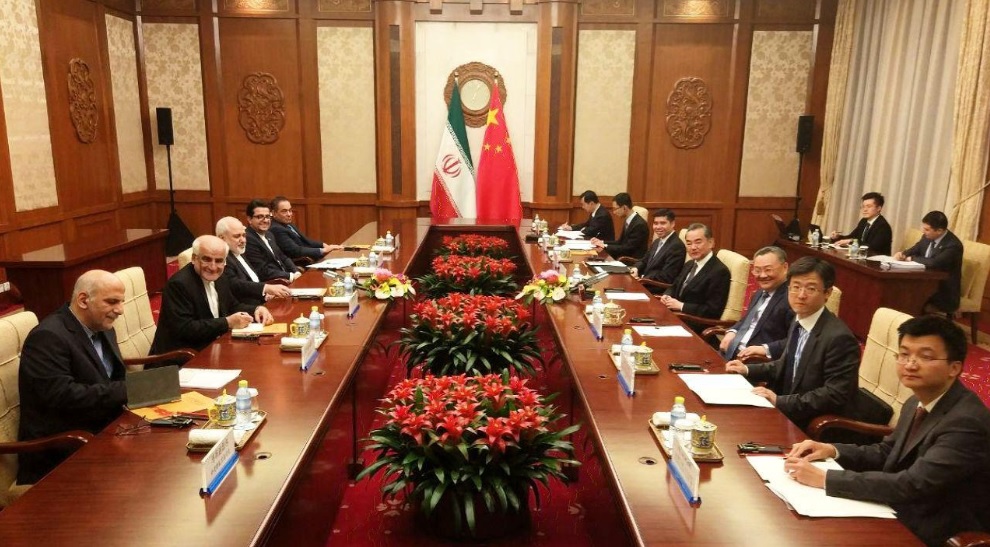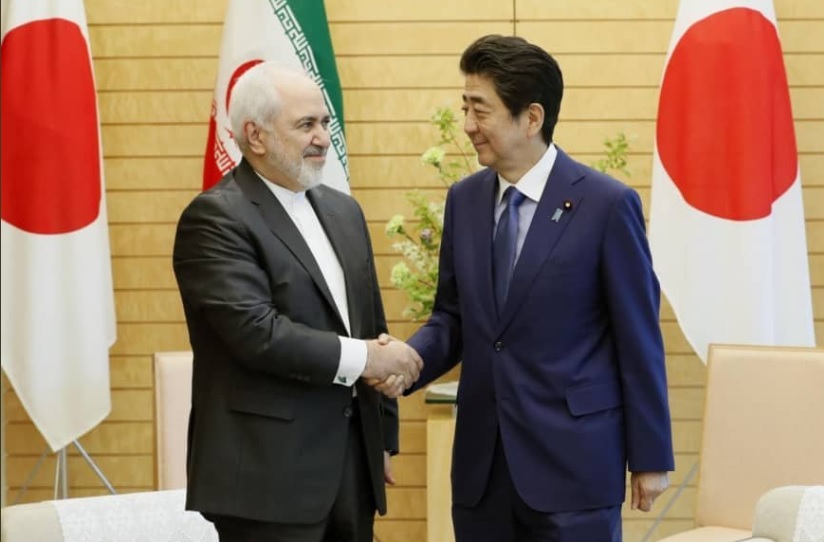China offered strong support to Iran on Friday, with its top diplomat telling Iran’s foreign minister that China opposes unilateral sanctions and supports Tehran’s efforts to safeguard its interests.
Iran has said it is committed to its obligations under an international nuclear deal despite the U.S. withdrawal from the agreement last year, and has called the re-imposition of U.S sanctions unacceptable.
Meeting in Beijing, Chinese State Councillor Wang Yi told Iranian Foreign Minister Mohammad Javad Zarif that given the important and rapidly-evolving situation, the two needed to strengthen communication and coordination.

Iranian Foreign Minsiter Mohammad Javad Zarif, left middle, starts talks with his Chinese counterpart Wi Yang, in Beijing. Photo courtesy of @JZarif
“China resolutely opposes the U.S. implementation of unilateral sanctions and so-called ‘long arm jurisdiction’, understands the current situation and concerns of the Iranian side, and supports the Iranian side to safeguard its legitimate rights and interests,” China’s Foreign Ministry paraphrased Wang as saying.
China appreciates Iran’s full implementation of the nuclear deal and intention to stick to it, Wang added.
“The dispute surrounding the Iranian nuclear agreement is essentially a contest between multilateralism and unilateralism,” he said.
China’s Foreign Ministry cited Zarif as saying that Iran has no intention to withdraw from the nuclear agreement and opposes war. “The Strait of Hormuz maintains its status as an international transportation channel,” the statement cited Zarif as saying.
China has close energy and business ties with Iran, but has to tread carefully as it has also cultivated good relations with Iran’s regional rival, Saudi Arabia.
Tanker unloads Iranian oil in China
A tanker carrying Iranian fuel oil in violation of U.S. sanctions has unloaded the cargo into storage tanks near the Chinese city of Zhoushan, according to ship tracking data on Refinitiv Eikon.
The discharging of the nearly 130,000 tonnes of Iranian fuel oil onboard the tanker, the Marshal Z, confirmed by a representative of the oil storage terminal, marks the end of an odyssey for the cargo that began four months ago.
Reuters reported on March 20 that some Iranian fuel oil had managed to evade the United States’ sanctions on petroleum exports by using ship-to-ship transfers involving four different ships, including the Marshal Z, and by using forged documents that masked the cargoes as originating from Iraq.
A second representative from the terminal operator, Zhoushan Jinrun Petroleum Transfer Co, said the cargo could not be Iranian oil, as the terminal had not received official shipments from Iran in at least the past four years. Both Jinrun representatives declined to be identified because of the sensitivity of the matter.
The unloading of the fuel oil comes less than two weeks after U.S. President Donald Trump’s administration stepped up moves to choke off Iran’s oil exports by scrapping waivers it had granted to big buyers of the country’s crude oil including China.
Refined products like fuel oil, mainly used to power ship engines and generate electricity, were not covered by the temporary waivers granted on the sanctions reintroduced in November 2018 as Washington seeks to pressure Iran into abandoning its nuclear program.
Reuters followed the movements of the Marshal Z since January using ship-tracking data available daily except when the ship was in deep waters and out of range of satellites.
From March 22 until arriving at the Jinrun terminal on the island of Liuheng on May 8, the vessel maintained a constant draught - how deep the ship sits in the water - of 15.9 meters (52 feet), according to the tracking data. That indicated the cargo was not discharged before reaching the terminal, about 30 km (18 miles) south of Zhoushan, near Shanghai.
Jinrun, owned by Herun Group, offers bonded storage at the terminal, according to its website, meaning that fuel can be stored there without clearing Chinese customs and officially entering the country. Herun officials referred questions back to Jinrun.
On May 12, the ship finished unloading the fuel oil as indicated by a change in its draught to 9 meters, and left the terminal, the tracking data showed. The vessel is headed for the waters just outside Singapore, set to arrive on May 21, the data showed.
From Malaysia to China
The Marshal Z took on the cargo from a larger tanker off the coast of the United Arab Emirates in January. It transferred the fuel oil to a second tanker, the Libya, off the Malaysian port of Malacca later that month, the ship-tracking data showed.
But potential buyers wary of the U.S. sanctions steered clear of the Marshal Z’s cargo. By March 22, the Marshal Z took the fuel oil back from the Libya and anchored off the Malaysian and Singaporean coasts.
The vessel lingered off Singapore and Malaysia in March and April, the ship tracking data shows, before sailing to Hong Kong and finally to Liuheng island, off the eastern Chinese province of Zhejiang.
“Transparency has been the thorn in the Marshal Z’s hull for quite some time now and owing to the issues regarding the alleged origin of her cargo nobody has been able to touch it,” said Matt Stanley, an oil broker at StarFuels in Dubai.
Reuters was unable to determine the financial terms surrounding the cargo’s unloading, but industry participants said it would likely have been on offer at a lower price to ensure a sale.
“Somebody in China decided that the steep discount this cargo most likely availed ... was a bargain too good to miss,” said StarFuels broker Stanley.
Reuters was unable to confirm who purchased the fuel oil cargo carried by the Marshal Z.
Reuters has not been able to determine the owners of the Marshal Z. According to a shipbroker report dated Jan. 28, the tanker was sold to an undisclosed buyer and intended for use as floating storage.
Japan wants to develop ties with Iran
Japan would like to maintain, and develop, its traditionally friendly ties with Iran, Prime Minister Shinzo Abe told Iranian Foreign Minister Mohammad Javad Zarif on Thursday.

Iranian Foreign Minister Mohammad Javad Zarif, left, shakes hands with Japanese Prime Minister Shinzo Abe. Photo courtesy of @JZarif
At the start of a meeting in the Japanese capital, Abe also told Zarif that he was concerned about growing tension in the Middle East.
Japan was Iran's third biggest oil client following China and South Korea before the US government decided not to extend oil sanctions waivers.
Iran wants to see practical steps
The international community and remaining signatories of Iran’s nuclear deal should act to save the accord as “supportive statements” are not enough, Iranian Foreign Minister Mohammad Javad Zarif told state media during a visit to Japan and China.
Last week, Iran notified the five remaining signatories that it would scale back some commitments under its 2015 nuclear deal, a year after Washington left the pact and reimposed sanctions on Tehran. Tehran has asked the other signatories to help protect its economy from U.S. sanctions.
“Safeguarding the (nuclear accord) is possible through practical measures, and not only through supportive statements,” Zarif was quoted as saying by the state news agency IRNA.
“If the international community feels that this (nuclear) accord is a valuable achievement, then it should take practical steps just like Iran does,” Zarif said on Iranian state television. “The meaning of practical steps is fully clear: Iran’s economic relations should be normalized.”
Before Japan and China, Zarif was in India to holds talks with fourth largest Iranian energy buyer who has stopped buying crude from Tehran.
The Iranian foreign minister's Asian tour, which started in Turkmenistan, is very significant as Tehran is seeking to build regional coherence with its traditional friends, to contain the US sanctions.